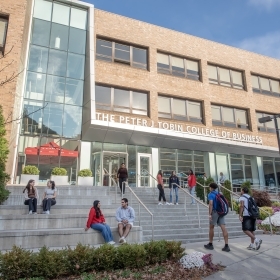5 Nutrition Tips for Incoming College Students

You have committed to your dream school—and now summer break is almost here. While it’s tempting to fully relax after your senior year of high school, this season is also the perfect time to start laying the groundwork for a healthier, more energized college experience.
Here are five easy healthy nutrition habits you can build to hit the ground running when your first semester begins.
1. Start Your Day with a Balanced Breakfast.
Breakfast truly is the most important meal of the day. A balanced breakfast with fiber-rich carbohydrates, heart-healthy fats, and a source of lean protein can improve memory, reduce your risk of chronic disease, support weight management, and boost your energy throughout the day.
Try experimenting with breakfast ideas you can easily prep in a college room or shared kitchen.
Pro tip
Many college campuses (including St. John’s University) offer breakfast options like oatmeal, yogurt parfaits, eggs, and high-protein wraps. Learning what fuels you best now can help you make faster, smarter choices later.
2. Move Your Body—Even in Small Ways.
Between summer jobs, friend hangouts, and last-minute college prep, don’t forget to get moving. It can be tempting to lounge on the couch all summer, but a sedentary lifestyle is linked to weight gain, muscle loss, and even a weakened immune system.
Even 30 minutes a day of walking, biking, or bodyweight exercises can make a difference. Regular movement helps reduce stress and builds stamina for your new routine in college.
3. Snack Smarter.
Snacking will likely become a daily habit in college, especially between classes, club meetings, and study sessions. So why not practice healthy snacking now?
Packaged snacks—like chips, cookies, and candy—are ultra-processed and high in added sugars and artificial ingredients, leading to fatigue, weight gain, and other health issues. Instead, consider snacks as “mini meals” that include fiber and protein to help keep you full and stabilize blood sugar levels. Here are some great options:
- Apple slices with nut butter (peanut, almond, cashew, or sunflower seed for an allergy-friendly choice)
- Baby carrots with hummus
- Greek yogurt with berries
- No-bake energy bites
- Protein-packed fruit smoothie
Pro Tip:
Start reading ingredient labels now so you’re better equipped to choose fuel—not filler—once surrounded by dining hall temptations and vending machines.
4. Rethink Your Drink.
Hydration is a game changer when it comes to focus and energy. Drinking enough water is linked to better focus, memory, metabolism, and digestion. Aim to drink mostly water and limit sugary beverages like soda, juice, sweetened coffee drinks, and artificially flavored electrolyte drinks, which can increase your risk for chronic conditions.
Want to make water more fun? Try infusing it with fresh fruit and herbs. Here are a few tasty combinations:
Getting in the habit of staying hydrated now means you’ll feel more alert and energized when college starts.
5. Get Enough Sleep.
Your body and brain recharge at night, so don’t skimp on rest. Not getting enough sleep can leave you feeling drained and unfocused. Aim for at least eight hours of quality sleep each night to help your body function at its best. You’ll thank yourself when the semester begins!
Looking Ahead
Taking care of your health doesn’t have to wait until move-in day. Building small, intentional wellness habits now can help you feel your best on campus.
If you are a future St. John’s student, I’ll be here to help guide your nutrition journey even further. Whether you’re curious about dining hall options, food allergies, or how to balance your meals, you can always reach out.
Want more support once you’re on campus? You can book a one-on-one session with me—your campus dietitian—at any time. Just email [email protected].






